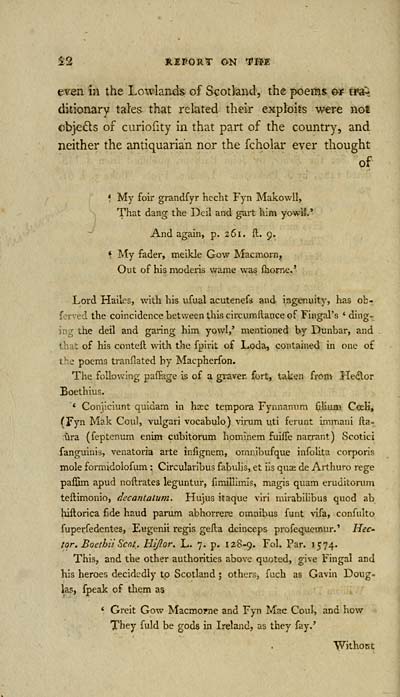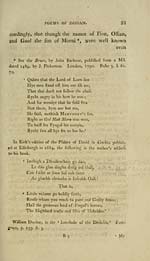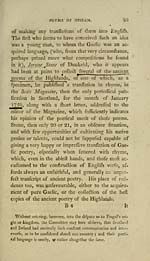J. F. Campbell Collection > Report of the Committee of the Highland Society of Scotland, appointed to inquire into the nature and authenticity of the poems of Ossian
(48)
Download files
Complete book:
Individual page:
Thumbnail gallery: Grid view | List view

i'2 REPORT ON TKE
even in the Lowlands of Scotland, the poems ojf tra^.
ciitionary tales that related their exploits were not
©bjefts of curiofity in that part of the country, and
neither the antiquarian nor the fcholar ever thought
of
« My folr grandfyr hecht Fyn Makowll,
That dang the Deil and gart him yo-wE.*
And again, p. 261. ft. 9.
i My fader, meikle Gow Macmorn,
Out of his nioderis w?jne was fhorne.'
Lord Hailes, with his ufual acutenefs and ingenuity, has ob-
ferved the coincidence between this circumllance of Fingal's * ding-
ing the deil and garing him yowl,' mentioned by Dunbar, and
that of his conteft with the fpirit of Loda, contained in one of
the poems tranfiated by Macpherfon.
The following pafBige is of a graver fort, taken from Heclor
Boethius.
'* Conjiciunt quidam in hcec tempora Fynnannm fihiim CceH,
(Fyn Mak Coul, vulgari vocabulo) virum uti ferunt immani fta-
ùra (feptenum enim cubitorum hominem fuiffe narrant) Scotici
fanguinis, venatoria arte infignem, ornnibufque infolita corporis
mole formidolofum : Circularlbus fabulis, et iis quae de Arthuro rege
paffim apud noftrates leguntur, fimillhnis, magis quam eruditorum
teftimonio, decantaluvi. Hujus itaque viri mirabilibus quod ab
hiftorica fide haud parum abhorrere omnibus funt vifa, confulto
fuperfedentes, Eugenii regis gefta deinceps profequemur.' HeC'
tor. Boethii Sent. HJJlor. L. 7. p. 128-9. Fol. Par. 1574.
This, and the other authorities above quoted, give Fingal and
his heroes decidedly to Scotland ; others, fach as Gavin Doug-
las, fpeak of them as
* Greit Gow Macmorne and Fyn Mac Coul, and how
They fuld be gods in Ireland, as they fay.'
Withorit
even in the Lowlands of Scotland, the poems ojf tra^.
ciitionary tales that related their exploits were not
©bjefts of curiofity in that part of the country, and
neither the antiquarian nor the fcholar ever thought
of
« My folr grandfyr hecht Fyn Makowll,
That dang the Deil and gart him yo-wE.*
And again, p. 261. ft. 9.
i My fader, meikle Gow Macmorn,
Out of his nioderis w?jne was fhorne.'
Lord Hailes, with his ufual acutenefs and ingenuity, has ob-
ferved the coincidence between this circumllance of Fingal's * ding-
ing the deil and garing him yowl,' mentioned by Dunbar, and
that of his conteft with the fpirit of Loda, contained in one of
the poems tranfiated by Macpherfon.
The following pafBige is of a graver fort, taken from Heclor
Boethius.
'* Conjiciunt quidam in hcec tempora Fynnannm fihiim CceH,
(Fyn Mak Coul, vulgari vocabulo) virum uti ferunt immani fta-
ùra (feptenum enim cubitorum hominem fuiffe narrant) Scotici
fanguinis, venatoria arte infignem, ornnibufque infolita corporis
mole formidolofum : Circularlbus fabulis, et iis quae de Arthuro rege
paffim apud noftrates leguntur, fimillhnis, magis quam eruditorum
teftimonio, decantaluvi. Hujus itaque viri mirabilibus quod ab
hiftorica fide haud parum abhorrere omnibus funt vifa, confulto
fuperfedentes, Eugenii regis gefta deinceps profequemur.' HeC'
tor. Boethii Sent. HJJlor. L. 7. p. 128-9. Fol. Par. 1574.
This, and the other authorities above quoted, give Fingal and
his heroes decidedly to Scotland ; others, fach as Gavin Doug-
las, fpeak of them as
* Greit Gow Macmorne and Fyn Mac Coul, and how
They fuld be gods in Ireland, as they fay.'
Withorit
Set display mode to: Large image | Transcription
Images and transcriptions on this page, including medium image downloads, may be used under the Creative Commons Attribution 4.0 International Licence unless otherwise stated. ![]()
| Permanent URL | https://digital.nls.uk/81742829 |
|---|
| Description | Volumes from a collection of 610 books rich in Highland folklore, Ossianic literature and other Celtic subjects. Many of the books annotated by John Francis Campbell of Islay, who assembled the collection. |
|---|
| Description | Selected items from five 'Special and Named Printed Collections'. Includes books in Gaelic and other Celtic languages, works about the Gaels, their languages, literature, culture and history. |
|---|

